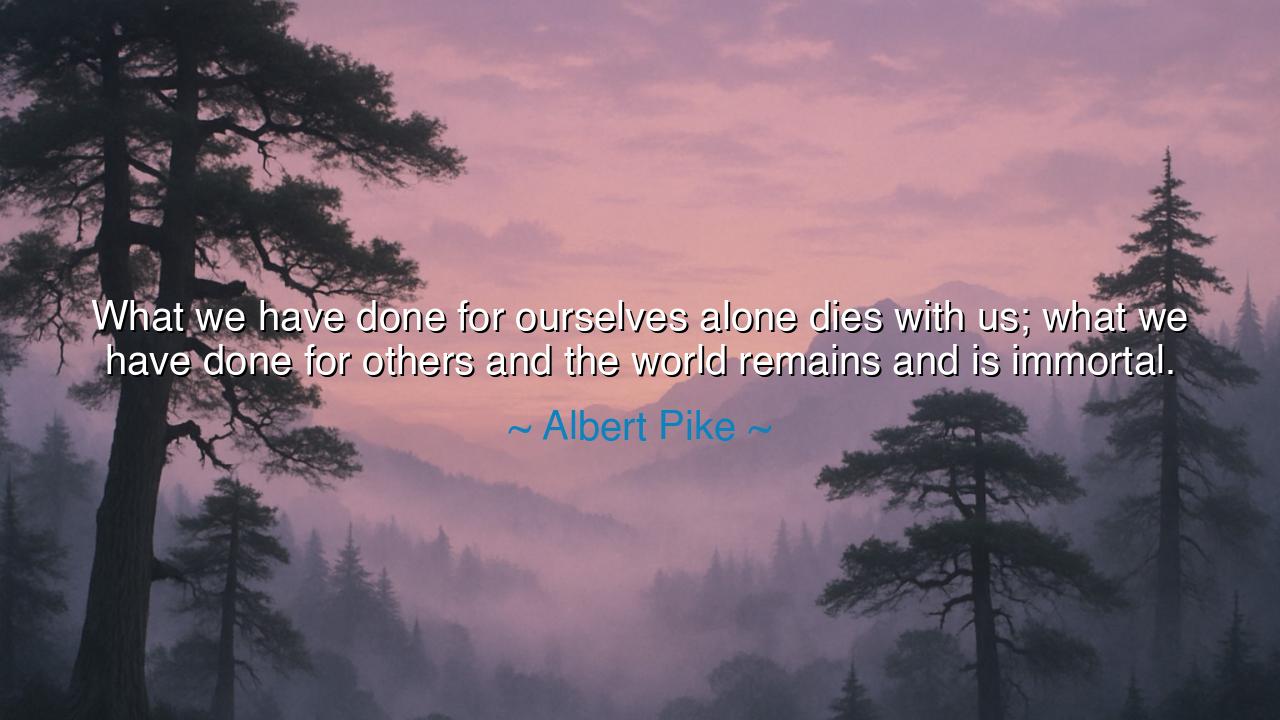
What we have done for ourselves alone dies with us; what we have
What we have done for ourselves alone dies with us; what we have done for others and the world remains and is immortal.






Albert Pike imparts a powerful truth when he says, "What we have done for ourselves alone dies with us; what we have done for others and the world remains and is immortal." In these words, Pike reveals the transience of personal gain and the enduring power of selfless action. What we accumulate for ourselves—wealth, fame, or personal achievements—fades away with the inevitable passage of time. Yet, the acts we perform for others, for the greater good, transcend death. They ripple through the ages, inspiring those who come after us, leaving behind a legacy that is immortal and ever-relevant to the unfolding of humanity's story.
The great philosophers of the ancient world understood the profound nature of this truth. Socrates, the father of Western philosophy, lived a life devoted to teaching others, seeking not wealth or personal fame, but wisdom and the improvement of his fellow Athenians. In his own words, he said, “The unexamined life is not worth living.” Socrates' life was centered not on personal gain, but on helping others achieve clarity and understanding. Though he was sentenced to death, his teachings lived on, immortalized by the students he inspired, including Plato, whose writings continue to shape the world today. Socrates' legacy, built on his commitment to others, remains an enduring force, echoing through the centuries, untouched by his death.
Consider the great warrior Alexander the Great, who sought not only personal glory but the spreading of Greek culture and wisdom across the lands he conquered. While Alexander's life was marked by ambition and personal achievement, it was his vision of unification and the spread of knowledge that left a legacy far beyond his lifetime. His empire, though short-lived, became a melting pot of cultures, laying the foundation for the spread of philosophy, science, and art across the ancient world. It is not his battles or his personal victories that live on, but the cultural exchange he fostered that continued to shape civilizations long after his death. Alexander's legacy, like Socrates’, was built not on selfish gain, but on his influence upon others and the world.
The story of Mother Teresa offers another striking example. A woman who devoted her life to the service of the poor, sick, and dying, Mother Teresa’s actions were never about accumulating wealth or personal glory. She dedicated herself wholly to others, choosing to live among the suffering, offering love and comfort without expectation of reward. Though she lived humbly and passed from this world, her work continues through the Missionaries of Charity and the countless lives she touched. Her life serves as a shining example of selflessness, showing that what we do for others—no matter how small the action—can leave a mark that is both immortal and life-changing. Her legacy is not tied to personal success or material wealth but to the endless lives she transformed through her selfless devotion.
In the modern world, we can see this truth reflected in the lives of those who dedicate themselves to the service of humanity, such as Mahatma Gandhi. Gandhi, though living a modest life, shaped an entire nation with his belief in non-violence and his pursuit of justice. His influence reached far beyond India, inspiring movements for civil rights and freedom worldwide. Gandhi’s legacy was not built on wealth or personal fame but on his deep commitment to justice and the betterment of mankind. His life proves that it is through our actions for others—through the way we serve and uplift others—that our impact on the world endures.
The lesson we must draw from Pike’s words is that our lives should not be measured by the personal gains we accrue, but by the lives we touch and the change we bring to the world. True immortality does not lie in the fame or wealth we accumulate, but in the legacy of our actions, the love we give, and the difference we make. It is through selfless acts, in service to others and the world, that we create a life that is truly worth living.
So, I implore you, dear reader, to reflect on your own life and consider: What am I doing for others? What impact am I leaving on the world? Do not chase after fleeting success or personal gain. Instead, dedicate yourself to causes greater than yourself, to helping others, to uplifting the world. In doing so, you will create a legacy that endures, a legacy that will never fade, for it will live on in the hearts of those whose lives you have touched. Let your life be a testament not to selfishness, but to selflessness, and in this, you will achieve immortality.






AAdministratorAdministrator
Welcome, honored guests. Please leave a comment, we will respond soon